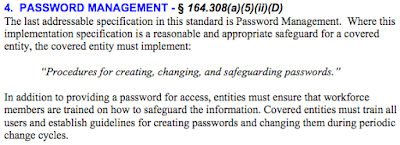What Acupuncturists Need to Know about Passwords & HIPAA!
Does your acupuncture practice have a password policy? Does it look like the picture above?
Don’t you hate when you’ve come up with a clever, awesome password, commit it to memory, and then get the dreaded “Reset Your Password” email? It almost seems to come too quickly. Didn’t I just reset my password?
As a Covered Entity, which handles PHI (Patient Health Information), having a password policy is important. Especially, for the computers and systems, you use for storing PHI.
But, what does having a password policy really mean and what should be in the password policy?
What does HIPAA say?
In the HIPAA Security Rule, under Administrative Safeguards, Password Management is specifically called out.
Let’s see what it says.
Now What?
- DON’T Reuse old passwords.
- DON’T Use simple passwords.
- Periodically reset passwords.
- DON’T Write passwords down.
How Jasmine Helps
Jasmine helps you manage your password policy within the system. Providing a self documenting policy within the software itself!
Whether you’re already using Jasmine, or planning to in the future, a good password management policy is important for keeping your patient’s PHI safe and secure!
Questions? Let me know in the comments below. I’d love to hear from you.
Minto Tsai
Founder
P.S. If this helped you, please Like, Share, email… all the social network love you can give!





